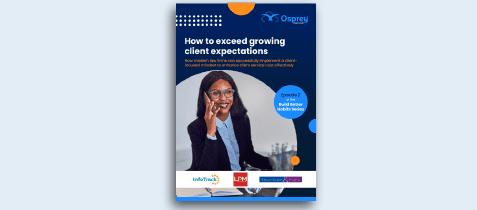Contents
Four priorities for honing your law firm’s competitive advantage and improving cashflow
In this conversation, Simon McCrum – former managing partner of the UK’s fastest growing law firm – shares his decades of experience to help you improve your firm’s cashflow, make more money per case, and outperform your peers on service quality.
Simon McCrum, owner of McCrum Management Consultancy and author of The Perfect Legal Business, joined me to launch our new interview series: Empowering law firm leaders. In this conversation we discuss how legal leaders can hone their competitive advantage and deliver excellent client service that they can charge more for.
In this conversation we cover:
- How to stand out from your peers
- Best practices on pricing models
- How to run a high-performing team
- How to improve cashflow
Simon’s quick-fire takeaways
With the power of hindsight, after learning from his own mistakes in his firm, Simon shares his four non-negotiables for running a success modern legal business. His four non-negotiables are:
- Good people only “If you have bad people, whether that’s attitude, behaviours, or performance, it completely undermines your good people.”
2. There has to be rules “Everyone’s got ideas, we’re all ambitious, but there has to be rules.”
3. Say no “Leadership have to be able to say no.”
4. It’s all about the cash “If you take your eye off the money pool, it changes everything for the worse, and quickly.”
Perfect firm of solicitors vs the perfect legal business
“History is littered with the perfect firm of solicitors that didn’t quite make it.” Simon outlines that cash is the crucial element missing from the perfect firm of solicitors. “The perfect firm of solicitors wasn’t about cashflow, it was about reputation. It was about the brilliance of lawyers, getting into the Supreme court, being highly ranked in the Legal 500. But there’s an eerie silence when you look at the business.”
When the monthly out goings of law firms – namely salaries – are so high, you have to keep up with the outflow of cash. Simon highlights that whilst firms are meeting demands of higher salaries, their profit behaviours aren’t keeping up. “Why aren’t firms making money? They haven’t got enough rules or team players rowing in the same direction.
“Billing targets are too low and it’s just not enough anymore. There needs to be a completely new approach to business efficiency to turn the passion and efforts of lawyers into cash.”

About Simon McCrum
Simon has decades of experience in the legal world, starting as a lawyer before quickly working through many roles within a law firm including team leader, business development, marketing, managing partner, and director. Since 2016, Simon has worked with law firms around Europe to help them run a successful business.
“My book, The Perfect Legal Business, is a summit of decades of experience in the legal world. I can understand the different roles because I’ve done much of it, and that helps me to move law firms forward and get the most out of their high-performing people.”
Four priorities for honing your law firm’s competitive advantage
Simon’s blueprint for running the perfect legal business focuses on ensuring cashflow, as highlighted above, but crucially it prioritises honing your firm’s competitive advantage – your client service. This enables you to exceed client expectations, charge your true value and empower employees with aligned values.
But for the perfect legal business to operate effectively, Simon emphasises that everyone need to be driven and focused on the same goal. “Having loads of people, in their own boats, rowing in different directions doesn’t get anyone far. The power – when all your brilliant people are in the same boat, rowing hard in the same direction – is unstoppable. There’s a transition period you have to go through to get everyone in the same boat, that period is hard, and a lot of firms simply don’t get there.”
In this discussion Simon highlighted four priorities firm’s should focus on to deliver quality client service.
Priority one: Commit to a service pledge
“If I had a thousand adults in a room and I asked them who has used a lawyer, most would say yes. If I then asked them ‘how was it?’, typically most people say it was not a great experience.” Because of that wide-spread perception of law firms, Simon knows that delivering an excellent, quality service that is focused on the clients’ needs, not the firms, is what will set legal practices apart from their peers.
“If you could change that opinion, so that every time someone interacted with your law firm, it was amazing, then a number of things would happen.
“Firstly, they’re going to come back to you, especially if you cultivate that relationship by cross caring. Secondly, your happy client will become part of your salesforce and marketing. Thirdly, price goes out the window.” But Simon emphasises that this can only happen if everyone in the business comes together and designs a service pledge.
The service pledge is a promise for how you’ll commit to your client. It becomes part of your brand and part of the boat that you’re all rowing in. “It’s a commitment from management that will celebrate people who put their hand up if they have let the service pledge down. If people can put their hands up so admit they’ve not touched a file on their desk for two weeks, it means our system works and we’ve got the right people – they buy into our culture.”
A key part of the service pledge process is asking for feedback from clients to ensure the pledge is being upheld. Simon highlights that it’s both the lawyers and the businesses responsibility for ensuring the service pledge is working: “There shouldn’t be an us and them approach.”
Priority two: Manage price
“I’m very proud of the service we delivered to our clients, but the problem is I didn’t charge for it. We offered a Bentley service and were charging Ford prices.” To hone your competitive advantage, you need to deliver on your promises, but also charge accordingly for the value you offer.
Simon believes that the billable hour is here to stay, but lawyers have to deliver a service that warrants the prices firms want to charge. The issue isn’t necessarily about the pricing model but the behaviours and structures of the firm.
“You need to reframe the conversation with your prospects to ensure you communicate the value you deliver – and how the price you offer is wrapped up in the service pledge you promise to deliver on.
“Clients who are obsessed with how cheap they can get the service aren’t good for the future of your business. People who want cheap will use you for matter one and then ring around for the next cheap price. People will buy quality; value buyers will appreciate the service you offer to make their life better and will use you again.”
Priority three: Say ‘no’ more
Simon explains that saying no is a crucial part of delivering excellent service – and therefore honing your competitive advantage – because it ensures you stay focused as a business. It means everyone is aligned and driven to pull in the same direction, but also means you attract and service the clients that you want to target.
“Your pricing strategy is a way of saying no to clients that you don’t want at your firm. If people want a cheap service, they can go down the road to get it.
“Saying no is important from a number of perspectives. Firstly, you have so many brilliant people in your firm who all have ideas, and you cannot operate a business if everyone is running around in different directions. Everyone has to be focused on the same direction, which means saying no to the things that might distract you and divert energy.
“Then there’s saying no to clients. You can’t deal with every client’s wish and I would start with pricing your work in a certain way to attract clients that want the Bentley service.
“And then there’s saying no to work that we’re just not that good at or don’t have much experience in – because you’re increasing risk. I’ve been bitten by dabbling before. It has to be part of the rules that says if we’re not brilliant at it then we’re not doing it.”
When pressure is high to improve cashflow and profits, it can be difficult to say no to work. But Simon advises firms to be brave and bold since, “quality hasn’t gone out of style.” He explains that people will buy quality but you have to deliver. The more clients you take on, the less time you have on your existing cases, which increases the risk that you don’t deliver on your service pledge. Simon recommends to, “make maximum money on every case and them make maximum cases out of every client.”
Priority four: Increase team productivity
Maximising cashflow whilst delivering quality client service requires a lean and efficient operation. Cashflow requires little waste in order to meet the high outflow of overhead costs. Simon discusses two things to improve productivity and that is efficiency and success measures.
“The amount of lawyers’ recorded time that is billed, even in high-performing law firms, is so low. You could secure growth of 50% without wining another client, but you have to stop accepting where we are in terms of productivity of lawyers.
“If lawyers are doing 50% of the chargeable hours, and only recovering 50% of what has been recorded, then they’re only generating money for the firm for 25% of their time.”
Simon highlights that this has to the be responsibility of both the lawyer and the business to collaborate, investigate, and plan as to why it isn’t working. If you want innovation in a law firm and to utilise the latest technology, then management have to find a way of easing the pressure for lawyers and freeing up time to do less, but better.
Simon explains, “if you have hundreds of cases you can forget innovation: no one has time because you’re putting out fires every day. If you can do less, better, for more, then you have time to think. Time then allows you to deliver the [promised] service, which allows you to charge more.”
The perfect legal business requires a high-performing team, a client-focused promise, and cash
Running a successful modern law firm demands a strong client-focus from leadership that clears the way of distraction so employees can be dedicated to the goal. Simon emphasises the importance of team work to create the perfect legal business, so everyone is responsible for driving in the same direction and can recognise the contribution of all roles.
When all of these parts work in harmony it improves efficiency, and your service, and then ultimately cashflow.
Watch the full interview with Simon McCrum now to discover more advice and guidance on honing your competitive advantage and improving cashflow. You’ll also hear Simon’s exclusive advice to all SME law firms that, if not addressed immediately, could have a detrimental impact on your future success.






